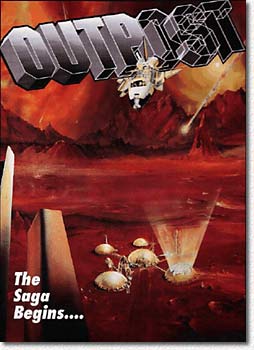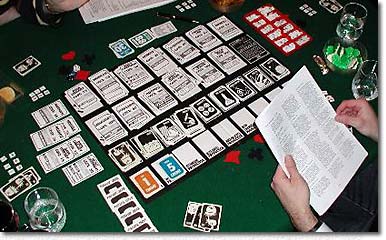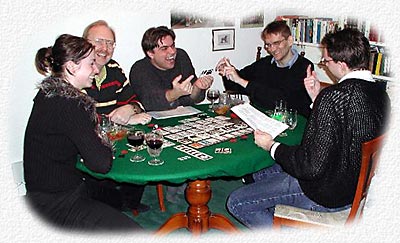
To begin at the end: around midnight, when after four hours' play it was clear who had won, the atmosphere was just as objective and free from aggression as it had been at the beginning. Peter spared us a sample of his collected paradoxes and we were able to get on with the game without any diversions. We rather generously gave the game an overall rating of 6.8.
What sort of a game is Outpost? Despite the flowery language in the playing instructions it is just an ordinary business and auction game. The fact that the scenario has been transferred to outer space, and that we are made the commanders of a space station, doesn't change the basic principle of the game: each player bids for Upgrade Cards (UCs), buys factories with which he makes a profit, and reinvests his income until the first player has acquired a certain quantity of the means of production and thus has won the game.
Of course there are certain interdependencies between the UCs (just as in Civilization): they award bonus points for the acquisition of certain additional UCs, they are conditions for buying certain factories or else they reduce the restrictions which each player is subject to (eg. the maximum number of workers employed in the factories, or the maximum number of production cards retained in the hand).
The production cards represent the profit that a factory produces, that is, the owner gets one production card per factory - the more expensive the factory, the higher the value of the corresponding production card. This value is however not in each case a fixed amount, but is distributed around an average value. If you are lucky you draw production cards with high values, if you are unlucky then you don't. To call this random factor a "clever mechanic" (as Mark Green does) is a very friendly remark. In my opinion the effect is simply somewhat chaotic.
 There are some more obstacles in the way of total
predictability, eg. not all the UCs are available in any given round of play.
Instead this is determined by a throw of the dice in a particular phase of the game.
If someone backs the wrong horse when making his game plan, he can quite easily be
unable to buy his intended UCs for the duration of several rounds.
There are some more obstacles in the way of total
predictability, eg. not all the UCs are available in any given round of play.
Instead this is determined by a throw of the dice in a particular phase of the game.
If someone backs the wrong horse when making his game plan, he can quite easily be
unable to buy his intended UCs for the duration of several rounds.
It has not yet been established what the optimal order is in which one should bid for or buy the UCs and the factories - and thank heaven for that. If this were the case we could forget the game entirely. As it is each player can still search for his own best winning strategy. From the start Peter saved up determinedly for the titanium factory. When he was able to afford it, he was already so far behind the field regarding the amount of his means of production that he was in no position to seriously hinder the modest water-workers. In his analysis Brian Bankler confirms that this strategy does not pay off. Nevertheless Peter finished in third place.
Moritz based his speculations on the scientist UC. This card is not very expensive and provides its owner with an additional production card in each round of play. Unfortunately the scientists very seldom came on to the market in our game. Moritz finished up among the also-rans, along with the other newcomers Andrea und Walter.
 Together with Günther and Hans I
decided upon the more obvious waterworks strategy, that is, we built up our water
production facilities for an affordable price and so were able to start earning
fairly well fairly quickly. Somehow I managed once to forget to claim a bonus and
another time I made a mistake in payment to my own disadvantage. Finally I wasted
time by reducing my restrictions as a precautionary measure, instead of
concentrating on more valuable factories - just too many mistakes to keep me on the
road to victory. Hans however managed to finish in second place.
Together with Günther and Hans I
decided upon the more obvious waterworks strategy, that is, we built up our water
production facilities for an affordable price and so were able to start earning
fairly well fairly quickly. Somehow I managed once to forget to claim a bonus and
another time I made a mistake in payment to my own disadvantage. Finally I wasted
time by reducing my restrictions as a precautionary measure, instead of
concentrating on more valuable factories - just too many mistakes to keep me on the
road to victory. Hans however managed to finish in second place.
Günther, who knew the game the best, was able to chalk up a win without any effective challenge. He began with the waterworks, then skipped over the titanium phase and then before anyone could blink an eye he was in possession of several New Chemicals. These provided him with so much income that it was clear he was going to be the winner several rounds before the end. Green's claim that "the game is remarkably well balanced with the lead changing hands every turn" does not correspond at all to our experience. The income increases exponentially and whoever is in the lead can't be caught by the others even if they join forces. With no problems Günther was able to win the auction for both the Moon-Bases as soon as the throw of the dice made them available and won the game with 84 Victory Points.
Westpark Gamers' Rating: 6.8
To complete the evening we played two rounds of Bluff. There were no spectacular details. Twice Hans started the final with an preponderance of 4 vs 1 dices, once against Andrea und once against me. He had no problems to bear the palm.
What seems remarkable is that Moritz, who used to win continually, doesn't have such a clear run now that Andrea no longer sits in the position immediately following his. Could it perhaps be that he can influence his wife more easily than the other Westpark-Gamers? We will just have to wait and see!